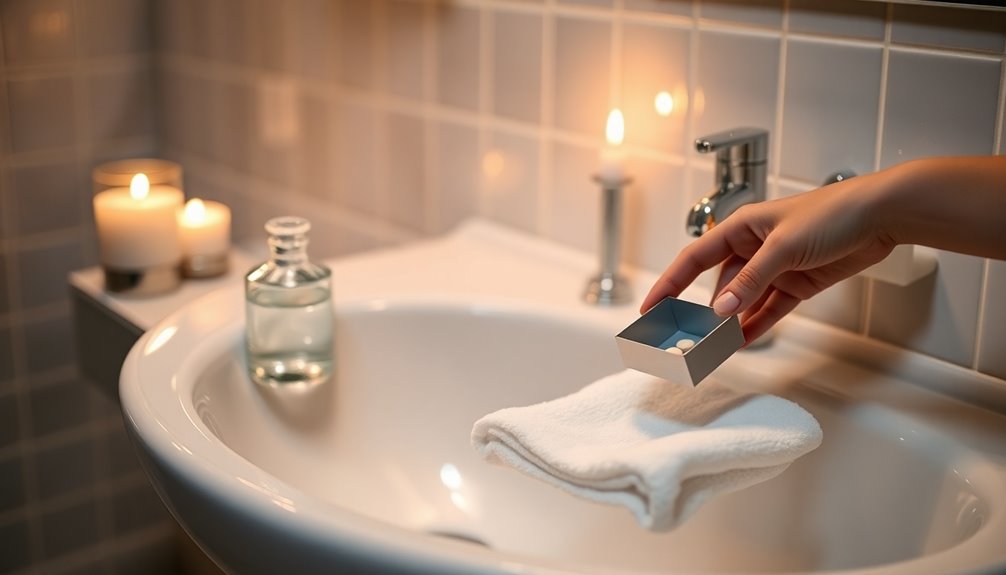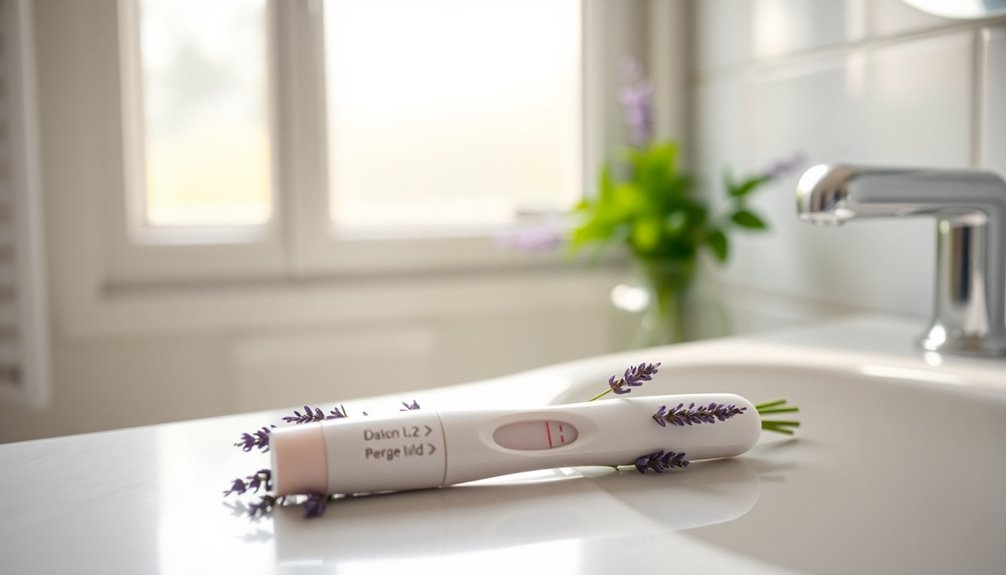To reduce sex drive in females, focus on lifestyle changes and therapeutic approaches. Regular exercise can benefit your mood and energy levels, while a balanced diet rich in foods like spearmint may lower testosterone. Stress management techniques such as yoga and mindfulness help stabilize emotions. Open communication with your partner enhances relationship dynamics, which can influence libido. If hormonal imbalances or health conditions play a role, consider consulting a healthcare provider. Exploring these strategies further can help you understand how to effectively manage your sexual health.
Key Takeaways
- Balanced Diet: Incorporate foods like spearmint and licorice, which may help lower testosterone levels and reduce libido.
- Regular Exercise: Engage in consistent physical activity to improve mood and energy levels, potentially decreasing sexual desire.
- Stress Management: Practice relaxation techniques such as yoga and meditation to alleviate stress, which can impact sex drive.
- Mindfulness Practices: Use mindfulness meditation to enhance self-awareness and help manage sexual urges effectively.
- Consult Healthcare Professionals: Seek advice on medications or hormonal treatments that may assist in addressing libido concerns.
Understanding Sex Drive

Understanding sex drive is crucial to maneuvering the complexities of female sexuality. Your libido can fluctuate due to hormonal changes, particularly estrogen and testosterone levels, which shift during menstrual cycles, pregnancy, and menopause.
These hormonal influences greatly impact your sexual desire. Psychological factors like stress, anxiety, and depression also play a critical role, either diminishing or heightening your interest in sex.
Additionally, relationship dynamics and lifestyle choices, such as exercise and diet, can shape your overall libido. Social influences, including cultural norms and expectations, further affect how you perceive sex and express your desires.
Recognizing this interplay of biological, psychological, and social factors is essential for understanding and addressing variations in your sex drive effectively.
Factors Affecting Libido

Numerous factors influence female libido, shaping how desire fluctuates over time. Understanding these influences can help you recognize why your libido may change. Key factors include:
- Hormonal fluctuations: Changes in estrogen and testosterone levels affect sexual desire throughout the menstrual cycle and menopause.
- Psychological factors: Stress, anxiety, and depression can greatly dampen libido.
- Relationship dynamics: Good communication and emotional intimacy with partners enhance sexual desire.
- Lifestyle factors: Fatigue, poor diet, lack of exercise, and substance use (like alcohol and drugs) can lower libido.
Additionally, cultural attitudes toward female sexuality can lead to feelings of shame or repression, further impacting your overall sexual desire.
Recognizing these factors is the first step in addressing any concerns.
Lifestyle Changes

Making lifestyle changes can greatly influence your sex drive, especially if you're looking to reduce it. Here are some effective strategies:
| Lifestyle Change | Benefits | Tips |
|---|---|---|
| Regular Exercise | Reduces energy, boosts mood | Aim for 30 mins most days |
| Stress Management | Enhances emotional stability | Try yoga or meditation regularly |
| Balanced Diet | Lowers testosterone levels | Include spearmint and licorice |
| Sleep Routine | Improves mood and reduces fatigue | Set a consistent sleep schedule |
Therapeutic Approaches

Lifestyle changes can create a solid foundation for managing sex drive, but therapeutic approaches can offer deeper insights and support. Consider these methods:
- Cognitive-behavioral therapy (CBT) helps you identify and change thought patterns related to high libido, providing effective coping strategies.
- Mindfulness meditation fosters self-awareness, allowing you to focus on the present and reduce impulsive sexual urges.
- Sex therapy provides a safe space to discuss libido-related issues, facilitating open communication with your partner about needs and concerns.
- Support groups, like Sex Addicts Anonymous, offer peer support and shared experiences, helping you navigate emotional issues tied to sexual desire.
These therapeutic approaches can empower you to manage your sexual desire more effectively.
Medical Considerations

When dealing with a high sex drive, it is essential to contemplate medical factors that could be influencing your libido. Hormonal imbalances, like low estrogen during menopause, can increase sexual desire. Certain medications, especially SSRIs, may lower libido. Health conditions such as PCOS and thyroid disorders require medical evaluation to identify and treat underlying issues. Additionally, narcissistic tendencies can sometimes exacerbate emotional stress, which may also impact sexual desire. Individuals experiencing chronic stress from emotional turmoil may find their libido significantly affected as well. It is also important to consider how advance directives can help manage medical decisions regarding sexual health. Engaging in complementary therapies like yoga and meditation may also assist in reducing stress and balancing overall well-being. Moreover, the impact of automation in business can be seen in healthcare, as it streamlines processes that ensure timely access to medical advice and treatments.
| Factor | Impact on Libido | Action |
|---|---|---|
| Hormonal Imbalance | High/Low libido | Consult healthcare professional |
| Medications | Potential decrease | Review prescriptions |
| Health Conditions | Affects sexual desire | Seek medical evaluation |
| Stress | May reduce libido | Consider stress management |
| Treatment Options | Balances libido | Explore tailored treatments |
Consulting a healthcare professional can offer effective solutions.
Frequently Asked Questions
How Can a Woman Decrease Her Sex Drive?
If you want to decrease your sex drive, consider incorporating regular exercise into your routine, as it can help balance hormone levels and reduce stress.
Try adding anti-aphrodisiac foods like spearmint and licorice to your diet.
Practicing mindfulness techniques, such as meditation or yoga, can also promote emotional well-being.
Open communication with your partner about your desires and boundaries can further help align expectations and manage feelings of sexual urgency.
How Can I Lower My Sex Drive Naturally?
When it comes to lowering your sex drive naturally, you've got to take the bull by the horns.
Start by incorporating regular exercise into your routine; it'll boost your mood and keep arousal at bay.
Add anti-aphrodisiac foods like spearmint to your diet, practice mindfulness through yoga or meditation, and guarantee you're getting enough sleep.
Communicating openly with your partner can also help ease pressure and align your needs.
How Can I Control the Urge for Sex?
To control the urge for sex, consider engaging in regular exercise, as it helps release endorphins that improve your mood.
Practicing mindfulness techniques like meditation and deep-breathing can lower anxiety and increase self-awareness, making it easier to manage impulses.
Additionally, talking openly with your partner about desires and boundaries fosters understanding.
If necessary, seeking therapy, such as cognitive-behavioral therapy, can provide effective strategies for coping with these feelings.
Why Is My Sex Drive so High Female?
You might think a high sex drive is purely physical, but it's often a mix of factors.
Hormonal fluctuations during your menstrual cycle can boost libido, while emotional intimacy with a partner can intensify desire.
Stress or unresolved issues may also play a role, as some use sexual activity as a coping mechanism.
Plus, lifestyle choices like exercise and diet can elevate your overall energy, contributing to that heightened sexual desire you're experiencing.
Conclusion
In your journey to reduce sex drive, remember that balance brings benefit. By embracing lifestyle modifications, exploring therapeutic techniques, and consulting medical professionals, you can create a calmer, clearer mindset. Prioritize patience and persistence, as these small changes can lead to significant shifts. With understanding and support, you're not just managing libido; you're fostering a fulfilling life. Stay committed, stay connected, and watch as your well-being flourishes!










